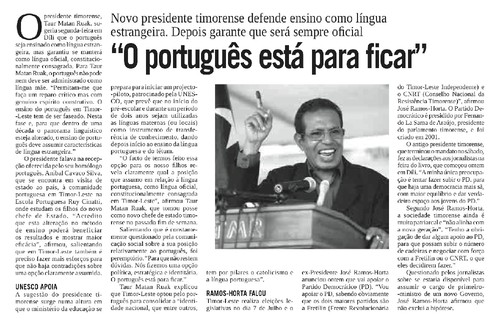
Is Timor Leste a Portuguese-speaking nation? This question has some geopolitical implications. After independence in 1999, Timor Leste’s new government restored Portuguese as an official language along with Tetum, an indigenous language. As a consequence, it joined, in 2002, the Community of Portuguese Speaking Countries (CPLP). Timorese policy makers see the organization (aside from ASEAN, which they hope to join soon) as a key element in their attempt to strengthen the country’s ties to other countries. Yet political leaders saw the Portuguese language as more than just a tool to strengthen ties to Brazil, Portugal, Angola and Mozambique. Its adoption also served as a powerful symbol that Timor was different from Indonesia, which was a Dutch colony.
But at the time of independence, Portuguese, which was outlawed during the Indonesian occupation, was spoken by only 5% of the population. The 2010 census found that the most commonly spoken mother tongues were Tetum Prasa (mother tongue for 36.6% of the population), Mambai (12.5%), Makasai (9.7%), Tetum Terik (6.0%), Baikenu (5.9%), Kemak (5.9%), Bunak (5.3%), Tokodede (3.7%), and Fataluku (3.6%). Another survey found that 90% of the population uses Tetum on a daily basis, in addition to other languages. 35% of the population speaks Indonesian (largely in the cities), and a growing share speaks English, a requirement to obtain the plum jobs offered by the considerable development industry in the country.
Efforts to popularize Portuguese have been slow. According to a World Bank Report, by 2009, more than 70% of the students tested at the end of the first grade “could not read a single word” of a simple text in Portuguese, “a dismal record after 10 years of efforts.” At the same time, it must be taken into account that until recently a considerable part of the population was illiterate, although most children go to school today.
Laws and administrative structures are based on the Portuguese model and remain in the Portuguese language, but most parliamentary debates and conversations in the cabinet are conducted in Tetum, which belongs to the Austronesian family of languages spoken throughout Southeast Asia.
Has Timor Leste benefited from being part of CPLP? While most policy makers would say yes, there are signs of unfulfilled expectations. Recently, the Timorese Parliament showed disappointment at the organization’s unwillingness to establish an emergency fund to support members in times of financial distress. In the same way, some say they had hoped for a stronger Brazilian presence in the country. There are more Portuguese-language teachers from Portugal in the country than from Brazil, and Brazilian aid payments were far smaller than from countries that had no cultural ties to Timor Leste.
And yet, when a Singapore-based commentator recently recommended that East Timor adopt English as the official language to embrace globalization, Ramos-Horta defended his choice of sticking to Portuguese: “Perhaps we are not as practical as our Singaporean brothers. I confess that we are somewhat romantic, we have a historical perspective, because we have a long history, and we do not merely have a commercial Singapore-style mentality. Does that mean that we are condemned to slow growth, for having a multilingual society and a rich society, vibrant and colorful, which makes us enjoy the beauties of life more frequently? I am sure the answer is no.” Portuguese may never overtake Tetum as Timor Leste’s lingua franca, but it seems set to remain one of the country’s official languages.
Read also:
Book review: “Beloved Land: Stories, Struggles, And Secrets From Timor-Leste” by Gordon Peake
Is Indonesia a Rising Power to be Reckoned With?
Supremacia militar norte-americana versus liderança econômica chinesa
Photo credit: 1. Hoje Macau/ Hoje Macau 2. Wikimedia Commons









